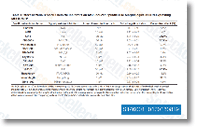Some main clinical centers are now starting to use a lot more compre hensive molecular profiling in clinical care. Nonetheless, these assays differ with regards to breadth, depth and design choice of the genes or inclu sion of a matched germline management. As being a consequence, the clinical utility might differ. The Cancer Genome Atlas, a consortium targeted on analysis and dis covery, sequenced the entire exome of tumors but at constrained coverage depth, rejecting specimens with less than 60% cellularity and avoiding the trusted identifica tion of subclonal mutations. Far more targeted commercial assays this kind of as Basis 1 may possibly make improved coverage depth of a smaller set of genes but don’t generally report the mu tant allelic fraction.
This kind of diagnostic services also omit the comparison that has a matched germline control, that’s essential to boost the analytical sensitivity and distin guish involving inherited variants and somatic mutations. Ultra deep targeted sequencing of matched tumor germline specimens has not but been evaluated inside a clinical setting. The sequencing Barasertib price of matched tumor germline samples is critical to distinguish somatic mutations from sequencing artifacts, it truly is also critical to create with certainty that a variant recognized in the tumor is somatic rather then inherited because filtering towards polymorphism databases can remove serious muta tions. During the absence of a matched germline DNA se quence, the misinterpretation of an inherited variant to get a somatic mutation could potentially protect against a patient from getting acceptable genetic counseling.
On top of that, inhe rited variation in metabolism genes such as DPYD or CYP2D6 has been linked with five fluorouracil toxicity and potentially tamoxifen efficacy, respectively, and, al even though the variants are unusual, a a lot more systematic clinical screening would supply critical benefits. The simul taneous sequencing description on the germline DNA together with the tumor DNA for that reason presents technical strengths to iden tify somatic mutations at minimal allelic fraction and increases the opportunity to determine actionable inherited variants. Here, we assess a targeted sequencing assay for its use in the cancer clinical setting. Especially, we performed UDT Seq of 47 genes that happen to be clinically actionable or im portant for patient care. We present that probably import ant information is acquired by sequencing at substantial depth, like identification of subclonal mutations.
Extra facts is also gained from your sequencing of matched germline DNA and in the inference of tumor DNA copy amount alterations. We as a result show  that in com parison with other high throughput sequencing procedures, UDT Seq of matched tumor germline DNA applied within a clin ical setting generates extra probably actionable findings to get a better quantity of individuals.
that in com parison with other high throughput sequencing procedures, UDT Seq of matched tumor germline DNA applied within a clin ical setting generates extra probably actionable findings to get a better quantity of individuals.
Igf Protein
Approximately 98% of IGF-1 is always bound to one of six binding proteins (IGF-BP)
